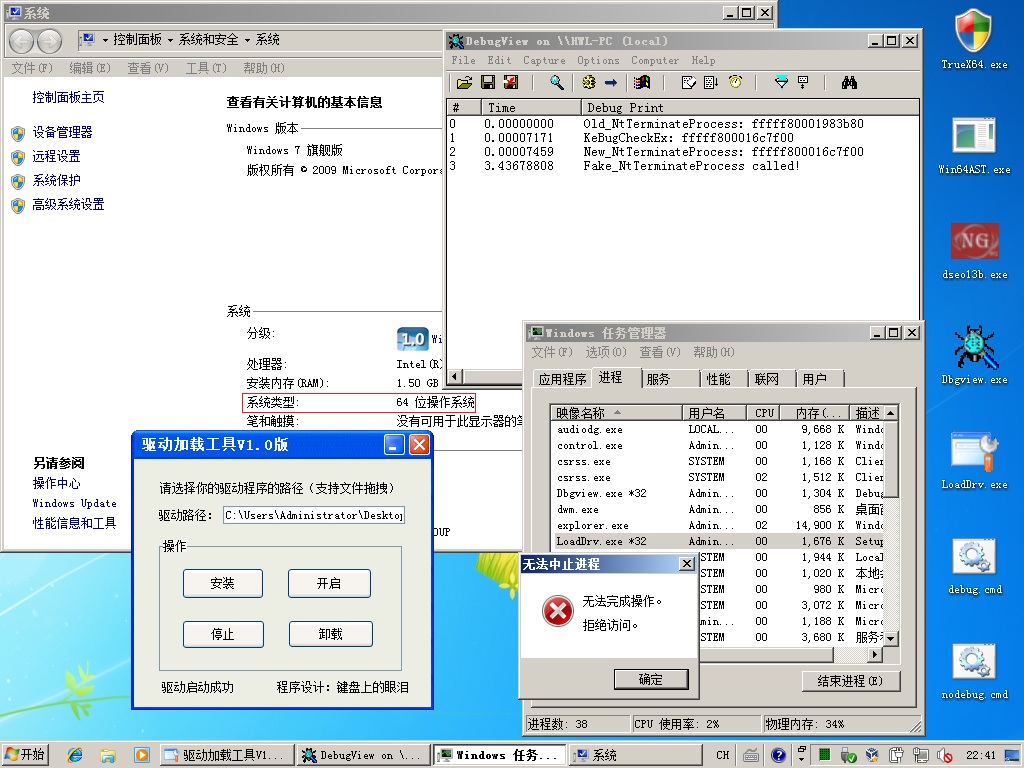Hook SSDT in Win7x64 is easy.
But I don't think it is useful.
Because you need to disable PatchGuard(use fyyre's DISABLE_PG_DS_V3).
This is the main code:
But I don't think it is useful.
Because you need to disable PatchGuard(use fyyre's DISABLE_PG_DS_V3).
This is the main code:
Code: Select all
//Author: Tesla.Angela [www.m5home.com/bbs]
#include <ntddk.h>
PSYSTEM_SERVICE_TABLE KeServiceDescriptorTable;
NTTERMINATEPROCESS NtTerminateProcess=NULL;
ULONG OldTpVal;
NTSTATUS __fastcall Fake_NtTerminateProcess(IN HANDLE ProcessHandle, IN NTSTATUS ExitStatus)
{
PEPROCESS Process;
NTSTATUS st = ObReferenceObjectByHandle (ProcessHandle, 0, *PsProcessType, KernelMode, &Process, NULL);
DbgPrint("Fake_NtTerminateProcess called!");
if(NT_SUCCESS(st))
{
if(!_stricmp(PsGetProcessImageFileName(Process),"loaddrv.exe")||!_stricmp(PsGetProcessImageFileName(Process),"calc.exe"))
return STATUS_ACCESS_DENIED;
else
return NtTerminateProcess(ProcessHandle,ExitStatus);
}
else
return STATUS_ACCESS_DENIED;
}
ULONGLONG GetKeServiceDescriptorTable64() //written by a foreigner
{
char KiSystemServiceStart_pattern[13] = "\x8B\xF8\xC1\xEF\x07\x83\xE7\x20\x25\xFF\x0F\x00\x00";
ULONGLONG CodeScanStart = (ULONGLONG)&_strnicmp;
ULONGLONG CodeScanEnd = (ULONGLONG)&KdDebuggerNotPresent;
UNICODE_STRING Symbol;
ULONGLONG i, tbl_address, b;
for (i = 0; i < CodeScanEnd - CodeScanStart; i++)
{
if (!memcmp((char*)(ULONGLONG)CodeScanStart +i, (char*)KiSystemServiceStart_pattern,13))
{
for (b = 0; b < 50; b++)
{
tbl_address = ((ULONGLONG)CodeScanStart+i+b);
if (*(USHORT*) ((ULONGLONG)tbl_address ) == (USHORT)0x8d4c)
return ((LONGLONG)tbl_address +7) + *(LONG*)(tbl_address +3);
}
}
}
return 0;
}
ULONGLONG GetSSDTFuncCurAddr(ULONG id)
{
LONG dwtmp=0;
PULONG ServiceTableBase=NULL;
ServiceTableBase=(PULONG)KeServiceDescriptorTable->ServiceTableBase;
dwtmp=ServiceTableBase[id];
dwtmp=dwtmp>>4;
return (LONGLONG)dwtmp + (ULONGLONG)ServiceTableBase;
}
ULONG GetOffsetAddress(ULONGLONG FuncAddr)
{
ULONG dwtmp=0;
PULONG ServiceTableBase=NULL;
ServiceTableBase=(PULONG)KeServiceDescriptorTable->ServiceTableBase;
dwtmp=(ULONG)(FuncAddr-(ULONGLONG)ServiceTableBase);
return dwtmp<<4;
}
VOID FuckKeBugCheckEx()
{
KIRQL irql;
ULONGLONG myfun;
UCHAR jmp_code[]="\x48\xB8\xFF\xFF\xFF\xFF\xFF\xFF\xFF\x00\xFF\xE0";
myfun=(ULONGLONG)Fake_NtTerminateProcess;
memcpy(jmp_code+2,&myfun,8);
irql=WPOFFx64();
memset(KeBugCheckEx,0x90,15);
memcpy(KeBugCheckEx,jmp_code,12);
WPONx64(irql);
}
/*
填写KeBugCheckEx的地址
在KeBugCheckEx填写jmp,跳到Fake_NtTerminateProcess
不能直接填写Fake_NtTerminateProcess的地址,因为它们不再同一个4GB
*/
VOID HookSSDT()
{
KIRQL irql;
ULONGLONG dwtmp=0;
PULONG ServiceTableBase=NULL;
//get old address
NtTerminateProcess=(NTTERMINATEPROCESS)GetSSDTFuncCurAddr(41);
dprintf("Old_NtTerminateProcess: %llx",(ULONGLONG)NtTerminateProcess);
//set kebugcheckex
FuckKeBugCheckEx();
//show new address
ServiceTableBase=(PULONG)KeServiceDescriptorTable->ServiceTableBase;
OldTpVal=ServiceTableBase[41]; //record old offset value
irql=WPOFFx64();
ServiceTableBase[41]=GetOffsetAddress((ULONGLONG)KeBugCheckEx);
WPONx64(irql);
dprintf("KeBugCheckEx: %llx",(ULONGLONG)KeBugCheckEx);
dprintf("New_NtTerminateProcess: %llx",GetSSDTFuncCurAddr(41));
}
VOID UnhookSSDT()
{
KIRQL irql;
PULONG ServiceTableBase=NULL;
ServiceTableBase=(PULONG)KeServiceDescriptorTable->ServiceTableBase;
//set value
irql=WPOFFx64();
ServiceTableBase[41]=GetOffsetAddress((ULONGLONG)NtTerminateProcess); //OldTpVal; //直接填写这个旧值也行
WPONx64(irql);
//没必要恢复KeBugCheckEx的内容了,反正执行到KeBugCheckEx时已经完蛋了。
dprintf("NtTerminateProcess: %llx",GetSSDTFuncCurAddr(41));
}
Attachments
This is the bin
(470.2 KiB) Downloaded 85 times
(470.2 KiB) Downloaded 85 times
